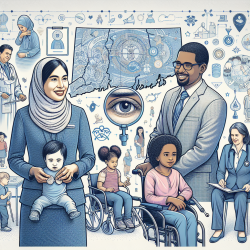The continuous evolution of professional skills is essential across various fields, particularly in healthcare and education. One such area that benefits significantly from targeted training interventions is radiation safety for oncology nurses. A recent study titled "Evaluating the effectiveness of a radiation safety training intervention for oncology nurses: a pretest – intervention – posttest study" provides valuable insights into how structured educational programs can enhance both knowledge and attitudes among practitioners.
Understanding the Study
The research conducted at Memorial Sloan-Kettering Cancer Center aimed to address common misconceptions about radiation safety among oncology nurses. Utilizing a pretest-intervention-posttest design, the study evaluated the impact of a comprehensive training program on the cognitive knowledge and attitudes of 113 registered nurses.
The intervention included several components:
- Revised nursing procedures to ensure clarity and consistency.
- A digital video addressing knowledge gaps and fears related to radiation.
- Interactive workshops for nursing leadership and didactic sessions for staff.
- Enhanced signage detailing necessary precautions for different radiation treatments.
Key Findings
The study revealed significant improvements in cognitive knowledge among participants. The mean score increased from 58.9% in the pretest to 71.6% in the posttest. This indicates that the intervention effectively enhanced understanding of radiation safety principles.
However, while there was an overall positive shift in attitudes towards radiation safety, only five out of nine evaluated areas showed statistically significant improvements. This suggests that while knowledge can be effectively imparted through structured training, changing attitudes may require additional strategies.
Implications for Practitioners
The findings underscore the importance of incorporating comprehensive educational interventions in professional development programs. Practitioners can improve their skills by:
- Engaging with multidisciplinary teams to develop high-quality training materials.
- Utilizing diverse educational tools such as videos and interactive sessions to address specific knowledge gaps and fears.
- Continuously evaluating and refining training programs based on feedback and outcomes.
Encouraging Further Research
This study highlights the need for further research to explore which elements of training interventions most effectively enhance both knowledge and attitudes. Future studies could investigate:
- The impact of individual components of training programs on learning outcomes.
- The effectiveness of tailored interventions for different sub-populations within the nursing field.
- The potential role of behavioral psychology in addressing underlying fears and misconceptions.
By continuing to refine educational strategies, practitioners can ensure they are well-equipped to provide safe and effective care in their respective fields.
To read the original research paper, please follow this link: Evaluating the effectiveness of a radiation safety training intervention for oncology nurses: a pretest – intervention – posttest study.










